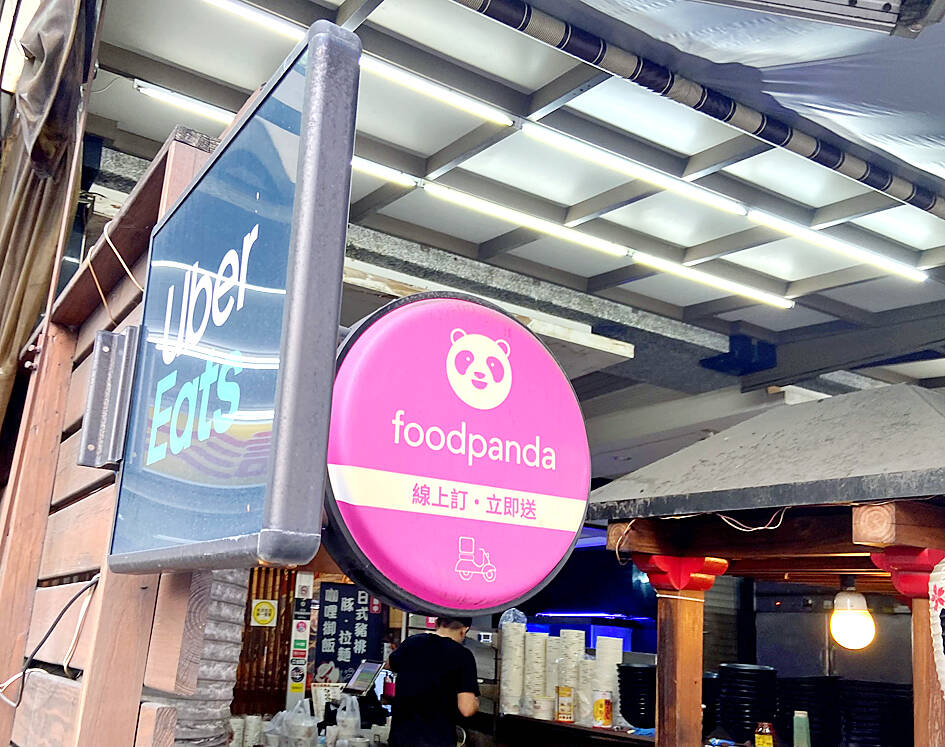The Fair Trade Commission (FTC) is to examine the impact of food delivery platform Uber Eats’ planned acquisition of Delivery Hero’s Foodpanda on market competition, particularly on changes in market share, the commission’s chair said on Thursday.
The FTC would primarily assess potential market share by analyzing the revenue, credit card receipts and number of deals of the domestic delivery platform giants, FTC Chair Lee May (李鎂) said after the agreement was announced.
Delivery Hero and Uber Eats have reached an agreement to sell its Foodpanda business in Taiwan to the latter for US$950 million, with the deal subject to regulatory approval, the company said on Tuesday last week.

Photo: CNA
“We will measure, with its major rival gone, the potential impact on [Uber Eats’] ability to [arbitrarily] raise prices, to work with other business operators [to pose a threat to market fairness] ... and to prevent other potential competitors from joining the market,” Lee said.
However, the result would not wholly hinge on whether the FTC regards Uber Eats as a monopolistic enterprise in the event of a successful merger, given that a monopoly can benefit the market under certain circumstances, the commission said.
The commission “holds a neutral attitude toward monopolistic structures” and would try to prevent a monopolistic enterprise from capitalizing on its market status rather than from coming into existence, FTC officials said.
It would also take into consideration the rights of those affected by the deal, such as restaurant operators and food delivery drivers, and hold public hearings to collect diverse opinions.
“We will then assess whether the overall economic pros brought by the merger outweigh the cons that come with limiting market competition before we make a final decision,” Lee added.
The FTC received Uber Eats’ acquisition request on Tuesday last week and is checking whether all necessary documents have been submitted before reviewing the merger, Lee said.
The case would be reviewed within 30 to 90 weekdays once the review starts, in accordance with the Fair Trade Act, he said
If the deal is passed, Uber Eats could have a market share of more than 80 percent in Taiwan, data compiled by the FTC in 2020 showed, which the commission pledged to re-examine.
The National Delivery Industrial Union hopes that Uber Eats would also take over the 140,000 delivery drivers hired by Foodpanda should the merger be approved, but no promises have been made, union advisor Su Po-hao (蘇柏豪) told the media on Tuesday last week.
Even if that wish is fulfilled, the deal might still leave local delivery drivers at the mercy of their new employer, as both companies have cut wages over the past few years, Su said.
Foodpanda and Uber Eats are far ahead of other competitors in terms of popularity in Taiwan.
A survey released in February by the Market Intelligence & Consulting Institute found that 73.6 percent of customers preferred foodpanda, 57.6 percent chose Uber Eats and no other competitor reached 10 percent.

Vincent Wei led fellow Singaporean farmers around an empty Malaysian plot, laying out plans for a greenhouse and rows of leafy vegetables. What he pitched was not just space for crops, but a lifeline for growers struggling to make ends meet in a city-state with high prices and little vacant land. The future agriculture hub is part of a joint special economic zone launched last year by the two neighbors, expected to cost US$123 million and produce 10,000 tonnes of fresh produce annually. It is attracting Singaporean farmers with promises of cheaper land, labor and energy just over the border.

US actor Matthew McConaughey has filed recordings of his image and voice with US patent authorities to protect them from unauthorized usage by artificial intelligence (AI) platforms, a representative said earlier this week. Several video clips and audio recordings were registered by the commercial arm of the Just Keep Livin’ Foundation, a non-profit created by the Oscar-winning actor and his wife, Camila, according to the US Patent and Trademark Office database. Many artists are increasingly concerned about the uncontrolled use of their image via generative AI since the rollout of ChatGPT and other AI-powered tools. Several US states have adopted

A proposed billionaires’ tax in California has ignited a political uproar in Silicon Valley, with tech titans threatening to leave the state while California Governor Gavin Newsom of the Democratic Party maneuvers to defeat a levy that he fears would lead to an exodus of wealth. A technology mecca, California has more billionaires than any other US state — a few hundred, by some estimates. About half its personal income tax revenue, a financial backbone in the nearly US$350 billion budget, comes from the top 1 percent of earners. A large healthcare union is attempting to place a proposal before

KEEPING UP: The acquisition of a cleanroom in Taiwan would enable Micron to increase production in a market where demand continues to outpace supply, a Micron official said Micron Technology Inc has signed a letter of intent to buy a fabrication site in Taiwan from Powerchip Semiconductor Manufacturing Corp (力積電) for US$1.8 billion to expand its production of memory chips. Micron would take control of the P5 site in Miaoli County’s Tongluo Township (銅鑼) and plans to ramp up DRAM production in phases after the transaction closes in the second quarter, the company said in a statement on Saturday. The acquisition includes an existing 12 inch fab cleanroom of 27,871m2 and would further position Micron to address growing global demand for memory solutions, the company said. Micron expects the transaction to